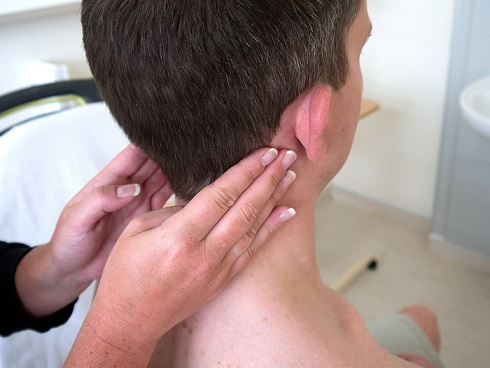Posterior cervical lymph nodes, tonsils, thymus gland, lymphatic vessels and fluid, and all lymph nodes at the groin, underarm and in the neck form the lymphatic system. Lymphatic fluid collects components such as bacteria and protein from different parts of the body and transports them to the lymph nodes. Then the lymph nodes destroy and remove these components. Located above the neck's base in a line that runs vertically at the back of the neck, these lymph nodes receive lymph from the head and neck area.

Causes of Swollen Posterior Cervical Lymph Nodes
1. Infections
The lymph nodes receive lymphatic fluid from the neck and the head. When there is an infection in the head, lymph nodes will collect and destroy the bacteria causing the infection. During this process, the lymph nodes may swell indicating that the body has an infection. Additional symptoms include bodily aches, congestion, and fever.
An infection in a tooth, throat, upper respiratory tract or a viral infection will also cause swollen lymph nodes. Normally, the swelling disappears after the infection. However, you should see a doctor if lymph nodes remain swollen and accompanying symptoms persist after an infection.
2. Systemic Causes
Autoimmune disease and other types of diseases lead to an immune deficiency, which can cause neck lymph nodes to swell. These diseases include rheumatoid arthritis, HIV/AIDS, and systemic lupus erythematosus (SLE). The swelling may affect other lymph nodes as well.
3. Drugs and Vaccines
Taking some drugs such as carbamazepine and phenytoin may lead to swollen neck lymph nodes. Vaccinations that cause the posterior cervical lymph nodes to swell include vaccinations against typhoid, mumps, measles, and rubella. The swelling is temporal.
4. Cancer
The lymphatic fluid can collect and transport cancer cells to the lymph nodes. When neck and head cancers spread, they cause the lymph nodes to swell. There is a need to seek immediate medical attention if any other signs of an infection do not accompany the swelling and if the patient has suffered from cancer before. A biopsy of the lymph nodes will reveal the real cause of the swelling. In this case, cancerous lymph nodes are removed.
Diagnosing the Symptoms
Doctors use the features of the swollen lymph nodes to determine their cause.
- Lymph nodes that swell because of an infection are painful, soft, inflamed, and mobile.
- Cancerous lymph nodes, on the other hand, are not painful, fixed, or hard.
- Connected lymph nodes are referred to as matter lymph nodes. These are caused by malignancy, sarcoidosis or tuberculosis.
- Shotty lymph nodes are hard, small with a rubbery consistency. Shotty lymph nodes may appear after an infection heals but do not have the same characteristics as malignant or infected lymph nodes.
Some of the symptoms that help doctors determine the cause of swollen lymph nodes include losing weight, fever, fatigue and sweating at night. Your doctor may recommend a biopsy before giving a conclusive diagnosis.
When to Worry
If lymph nodes swell because of an infection, the swelling will disappear when the infection is resolved. You should see your doctor if:
- Lymph nodes swell without any underlying condition
- The swelling is accompanied by weight loss, a persistent fever or excessive sweating at night
- The swelling is rubbery, hard and fixed
- Swollen posterior cervical lymph nodes are accompanied by breathing problems, difficulty swallowing or a sore throat
- The swelling continues to increase and persists for 2-4 weeks
How to Deal with It
Medical Treatments
The treatment options for swollen lymph nodes vary depending on the underlying cause.
- Infections: If a viral infection causes swollen lymph nodes, they will return to normal when the infection resolves. Antibiotics are ineffective in treating viral infections.The recommended treatment for bacterial infections is antibiotics. The HIV infection may lead to swollen lymph nodes and doctors will recommend treatment for the infection to treat the swelling.
- Immunity disorder: Treatment for swollen lymph nodes is directed to underlying conditions such as rheumatoid arthritis and lupus.
- Cancer: Cancer treatments are used to resolve cancerous lymph nodes. The treatments used depend on the cancer type and include chemotherapy, radiation, and surgery.
Home Remedies
Some of the home remedies that you can use to treat swollen lymph nodes include:
- Applying warmth: Use a wet, warm compress to relieve swelling on posterior cervical lymph nodes. You can dip a dishcloth in hot water, wring, and then apply it on the nodes.
- Pain medication: You can use over-the-counter pain medication to relieve fever and pain. Some of the recommended pain relievers include ibuprofen such as Motrin IB and Advil, acetaminophen such as Tylenol and aspirin. Consult your doctor before giving your child aspirin because it may lead to Reye's syndrome. Although Reye's syndrome is rare, it is a serious illness in children and teenagers which affects the brain, liver and blood of a patient recovering from a viral infection.
- Rest: Getting enough rest every day will hasten your recovery from the condition that led to swollen lymph nodes.
